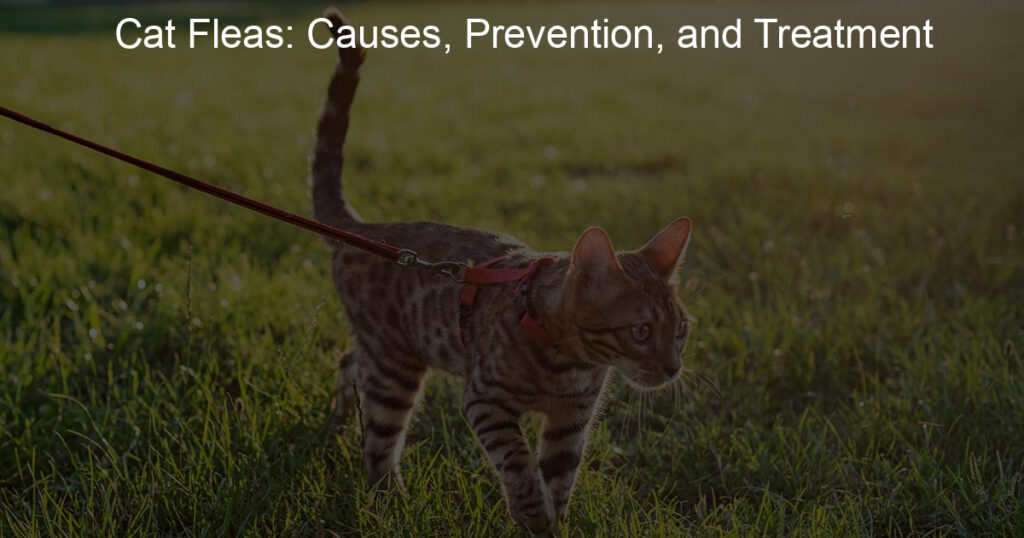Do you have a flea problem with your beloved cats? Don’t worry, you’re not alone! Cat fleas are common nuisances for any feline parent, and it’s important to take steps to understand the causes and treatment of such an issue.
In this blog post, we will cover the basics of cat flea infestations, how they can be prevented, and effective treatments that won’t harm your cats or your home life. With this information in hand, cat owners can stay prepared with their furry family members!
What causes cat fleas?
Cat fleas are a common nuisance among felines, but most pet owners don’t understand their root causes of them. In reality, these tiny insects don’t just appear by chance– they proliferate in response to environmental factors such as excess humidity and heat.
Not cleaning litter boxes often enough or feeding cats outside can also result in an infestation due to contact with other animals and their environment. Allowing cats to come into contact with stray animals can increase their chances of bringing fleas home too.
Needless to say, it’s important to take preventive measures like regular grooming sessions, vacuuming your carpets often, and using flea-control medications so your kitties stay flea-free!
How do you treat and prevent fleas on cats?
If your cat has fleas, don’t despair. There are several steps you can take to effectively treat and prevent fleas on cats with relative ease. The first step is to use a flea comb on your cat; this will help remove adult fleas before they get a chance to lay eggs.
Additionally, bathing your cat with a vet-recommended shampoo can help keep them clean while also killing off any existing fleas. Once the bath is done, use an anti-flea topical medication or collar (make sure it’s the right size for your pet!) to keep potential future infestations at bay – these substances usually last anywhere from two to three months if used correctly.
Finally, it’s important to make sure all areas of your home where the cat sleeps or spends time are vacuumed regularly as this can help break the flea’s egg cycle. With consistency and diligence, you’ll be able to protect your feline pal from any pesky pests in no time!
How do you clean a cat with fleas?
Cleaning a cat with fleas is no easy task, but luckily many tools can make the experience much easier. Perhaps the most fundamental tool in this regard – when dealing with fleas – is a flea comb. A flea comb can be used to detect and remove fleas from your pet’s fur, by combing through the fur with even strokes until the flea is found and subsequently removed.
You should also invest in a special kind of shampoo specifically formulated for pets; many brands offer products specifically suited to cats and Fleas alike, thus making bath time much more effective than an ordinary shampoo. Ensuring you bathe your cat at least every two weeks will ensure your beloved feline friend remains clean and free of pesky parasites!
What is the best treatment for cat fleas?
When it comes to dealing with cat fleas, taking time for prevention is key. Regular bathing and grooming of your companion will give them a fighting chance against these pests, as well as serious illnesses that may be caused by infection.
Spot spraying with an appropriate insect repellent or flea control product designed specifically for cats can also be effective in controlling infestations. Be sure to consult your veterinarian before using any products on your feline, and follow all instructions carefully.
If the problem persists or worsens after establishing a preventative routine, you may need to enlist the aid of professional pest control services specifically tailored to addressing flea infestations in cats. Ultimately, swift action is essential when it comes to ensuring optimal health and comfort for your beloved pet.
How can I prevent my cat from getting fleas?
Taking the steps to ensure your cat doesn’t pick up fleas can seem like an intimidating and daunting task, but luckily there are some effective measures you can take to stop the pesky parasites. Keeping your cat’s bedding clean regularly and providing a regular flea prevention treatment can go a long way.
Additionally, don’t forget to groom your kitty regularly – brushing away dead fur or flea dirt may provide clues that something is awry before an infestation occurs. If an issue arises, contact your veterinarian who can provide specialized recommendations on how best to rid your cat of those pesky parasites.
Conclusion
All in all, tackling a flea problem can make your cat’s life more comfortable, and it’s important to stay vigilant against them. Remember that prevention is key — keep up with flea treatments, wash your pet’s bedding frequently, and vacuum carpets regularly (especially if they’ve been outdoors recently). If you suspect your cat has fleas, consult with a vet or use special treatments or preventive medications.
Taking good care of your cat’s health starts with understanding feline parasites like fleas — arm yourself with knowledge now to give your cat the best chance for a healthy future. Adopting good hygiene practices for both your pet and its environment will help keep those pesky critters away for good!












